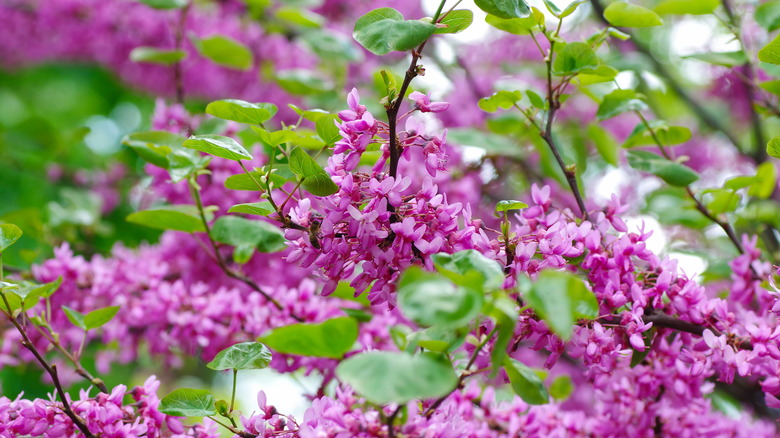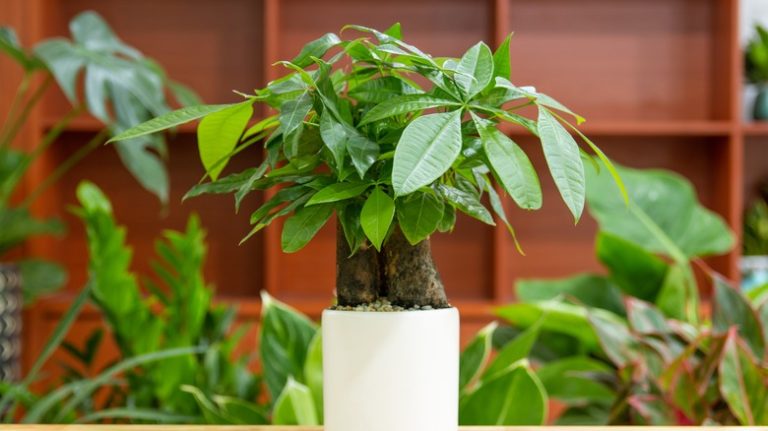Garden Trees, Shrubs & Vines
Kyle Schurman
If you are seeking a flowering tree that’s perfect for the yard, one of the best options is the Judas tree (Cercis siliquastrum), also known as the Eastern redbud. Successfully growing a redbud tree can be a bit of a challenge, as it needs plenty of space for its wide roots and branches, allowing for proper airflow. The Eastern redbud also has a susceptibility to various types of fungi, meaning you need to be on the watch for things that could cause damage to it. The steps to combat diseases with the Judas tree depend on the type of fungus, but they typically involve pruning, watering, or other simple maintenance tactics.
Any time damage begins appearing on the bark or leaves, it can be extremely dangerous for the health of the Judas tree or for any other kind of tree. Fungus can prevent the leaves’ ability to make use of photosynthesis. It can also break down the structure of the branches and their ability to support any weight. Eventually, it could kill everything.
A Judas tree could end up acquiring fungus through a number of different means. The spores are constantly present in soil and in the air, so the spores may land on the bark or leaves through rain splashing the soil onto the bark. Further, fungi can also spread through cuts and pests. Although these trees can withstand many types of fungi successfully, it’s important to treat any issues you see as quickly as possible.
Treating fungi on the leaves

Julia Senkevych/Getty Images
Although all types of fungus eventually cause problems with the leaves of the Judas tree, some fungi start by attacking the leaves. Bacterial leaf scorch is one of the most dangerous types of fungi to infect the Eastern redbud, eventually causing its death. Additionally, there is no cure for bacterial scorch, caused by the Xylella fastidiosa bacteria. It invades the tissues that move water and nutrients, causing significant health problems.
With this fungus, you will notice your Eastern redbud start to prematurely lose its leaves to browning in the middle of summer rather than in the autumn. The older sections in the middle of the canopy show the effects of this browning first before it spreads outward toward the tips of the branches. As the disease spreads over several years, you’ll notice more and more of the branches becoming affected until the Judas tree dies. Because there is no cure, it’s important to prune affected areas as quickly as possible. Watering the tree deeply to give it more moisture could also minimize the effects of this disease.
Root and crown rot can also affect the Eastern redbud. These diseases, which come from the fungus Phytophthora, cause the leaves to turn yellow and drop prematurely. Never plant a Judas tree in an area where root and crown rot have appeared in the past. If you believe you are seeing this fungus, improve the drainage around the Eastern redbud and deeply water the soil.
Dealing with fungi damage on branches and the trunk
Floki/Shutterstock
Some types of fungi attack the Judas tree in areas other than the leaves, although you may see problems with discoloration on the leaves eventually. You have a better chance of treating the problem early if you can see signs of the fungus on the bark or trunk before the leaves suffer damage.
Anthracnose is a type of fungus that attacks the Judas tree, creating small discolored spots on the trunk or bark that are tan or black. It also creates cankers that can appear on branches. Occasionally, it creates pink groupings of spores that can appear especially when the weather is hot and humid. Eventually, the leaves can die and fall off. To treat this fungi on the Eastern redbud, prune any segments that are showing cankers below the spot of the disease and destroy these branches. Disinfect the pruners after using them to avoid spreading any of the spores. To reduce the chance of your tree acquiring this disease, thin out any overgrowth in the branches of the Eastern redbud, which encourages airflow through the canopy.
Another fungus that can affect the Judas tree is Cytospora canker. This appears as dark-colored cankers on the bark of the branches. Eventually it spreads around the entire circumference of the branch, causing the leaves on the affected branch to die. The best treatment is to prune areas of the Judas tree that are showing signs of these cankers.
